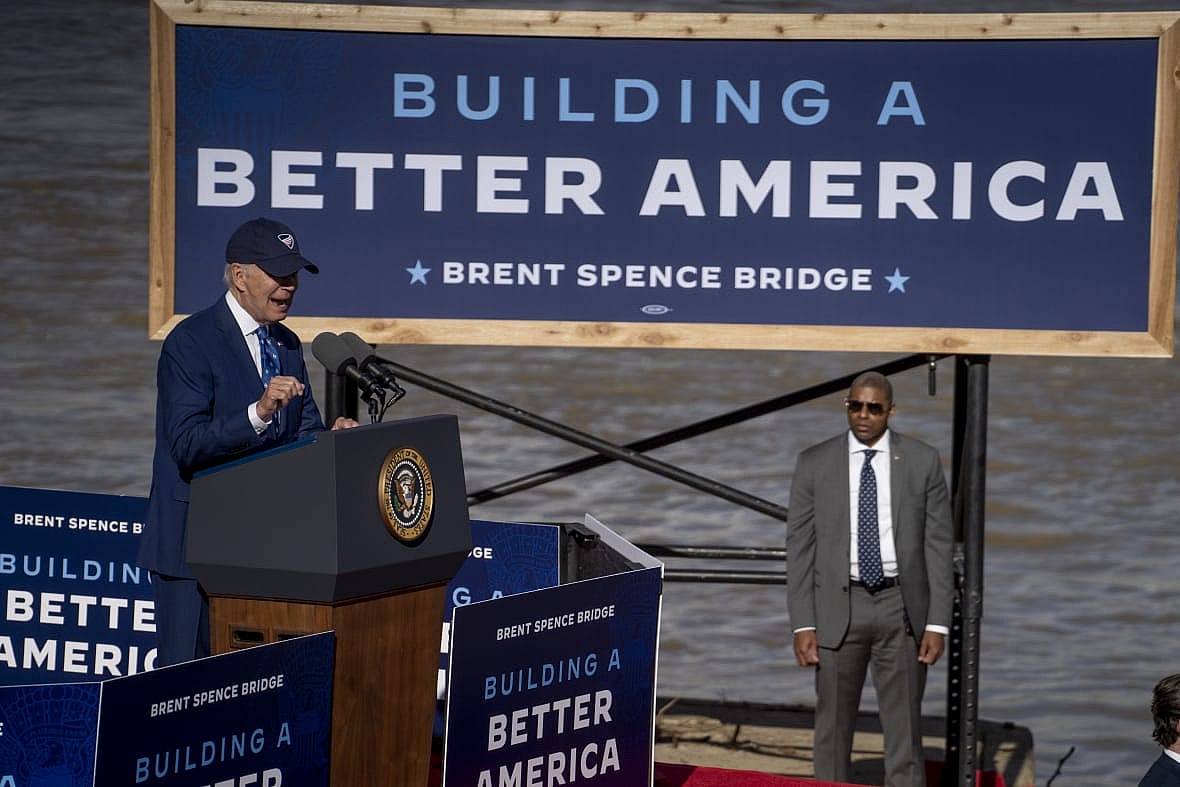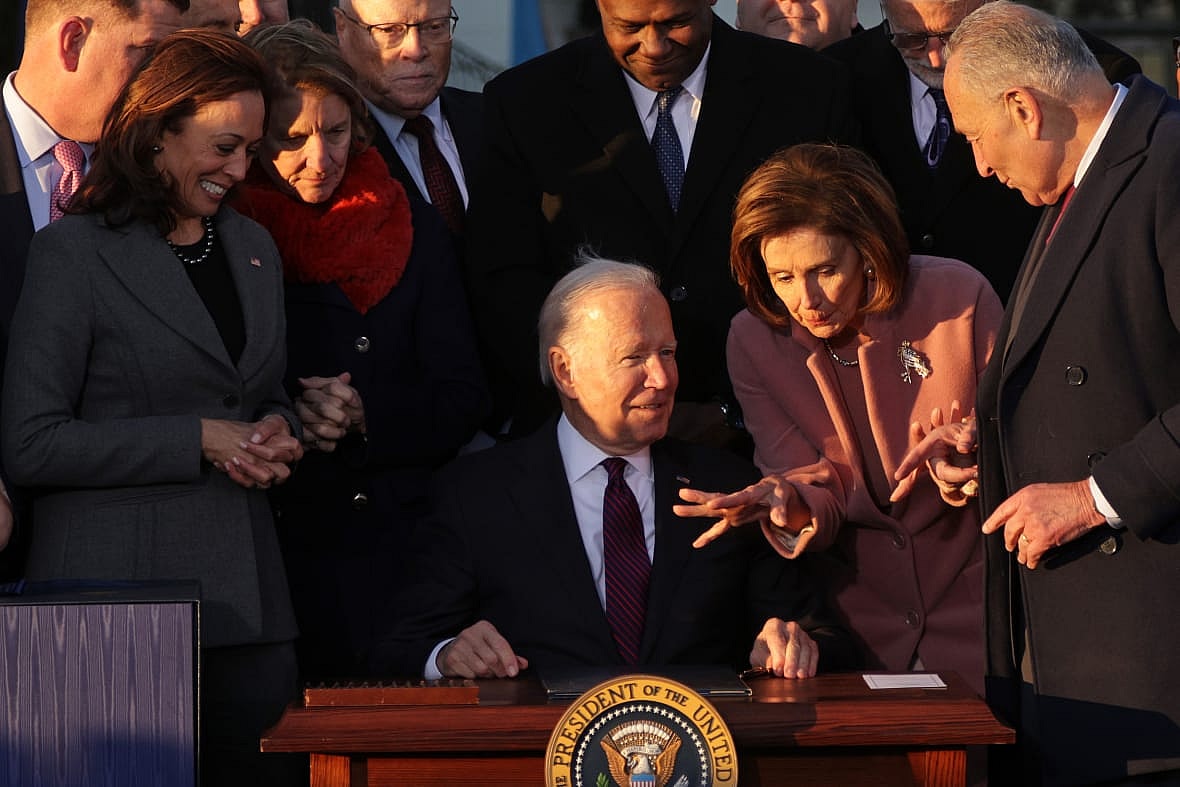As Republicans on Capitol Hill struggle to elect the next speaker of the U.S. House of Representatives, the White House is forging onward in the new year, touting its legislative achievements and economic agenda.
On Wednesday, President Joe Biden traveled to Covington, Kentucky, and Vice President Kamala Harris traveled to Chicago to promote the billions of dollars invested in the nation’s roadways, bridges, and other infrastructure projects — and the millions of jobs created in the process.

While the bipartisan Infrastructure Investment and Jobs Act was signed into law by President Biden in late 2021, and first implemented in 2022, billions of dollars from the law are being put to work this year across the country.
Mitch Landrieu, a Biden senior adviser responsible for coordinating the implementation of the infrastructure law, tells theGrio that a significant focus of the administration is rebuilding bridges and roads that connect historically segregated Black and brown communities.
“If you’re in the rural South, or you’re in the Black Belt, or you’re in Appalachia, and you go talk to folks in the African-American community, and you say where you live at? They’re going to say I live on the other side,” noted Landrieu. “The other side of what? The other side of a railroad track, the other side of a highway that split my neighborhood in half, the other side of the water because the rich folks live on the other side and have been, you know, on the bad end side of infrastructure disinvestment.”
Landrieu said the projects funded up and down the east coast, from northeast to midwest, and on the west, will “connect communities, especially communities of color, to economic opportunity, and of course, improve folks’ lives in a big way.”
An example of that racial divide is in Chicago, where Vice President Harris visited one of the four bridges crossing the Calumet River. Grant funds will help rehabilitate the moveable bridges crossing the river. The White House noted that the four bridges are critical for marine traffic to and from the Illinois International Port and surrounding industry.
“For many years, this bridge and three more nearby have served a critical role for communities in Chicago and Northwest Indiana,” said Harris in her remarks on Wednesday while standing in front of the 95th Street Bridge in the Southside of Chicago. “People across this bridge every day have traveled on their way to work or taking their children to school.”
Today, @VP Harris visited Chicago to announce the new Bridge Investment Program that will be implemented in the City thanks to the Bipartisan Infrastructure Law. 🧵 pic.twitter.com/zFVwLNv5XM
— Mayor Lori E. Lightfoot (@chicagosmayor) January 4, 2023
The Biden-Harris administration has been touting not only the projects that will transform and modernize America’s infrastructure but also create new jobs, particularly in Black communities and other communities of color. The White House says that, so far, more than 10 million jobs have been created during Biden’s presidency. More good-paying jobs are especially needed as the administration continues to work to fix an economy marred by inflation.
During his remarks in Covington on Wednesday, President Biden said, “You can’t have the best economy in the world without having the best infrastructure.” He added, “For years, people talked about this problem, but now I am proud to say we will finally fix this problem.”
Landrieu qualified the Biden-Harris administration’s commitment to rebuilding the nation’s economy and infrastructure: “This is going to be an opportunity for people to build generational wealth and, as the president said, to have not only dignity in the work that they do, but to put a little change in their pocket to make sure that everybody has got a little bit more breathing room.”
Andre Perry, a senior fellow at the Brookings Institution who studies economic development, tells theGrio that while he applauds the needed investments from the infrastructure law and other landmark bills signed by President Biden, he is concerned those dollars won’t reach Black communities.
“When you deploy resources to local communities, local politics take hold, and we know that discrimination happens at a local level,” said Perry. “And while the federal government is doing its best to make sure that money is getting to disadvantaged communities, there’s no guarantee that these dollars will benefit Black people in particular.”
He explained, “The overwhelming majority of those monies are going to go to support organizations and groups that could very well discriminate against Black people. So I think it’s a good effort, but it’s not a perfect workaround.”

Perry said that he supports policies that are more directly targeted at Black communities like the Biden-Harris administration’s Justice40 Initiative, which seeks to ensure at least 40% of investments in environmental and climate projects go directly to Black and underserved communities.
“If we see more muscular policies in that regard, deliberately addressing disadvantaged communities, then we’re really taking bigger steps forward,” said Perry.
Landrieu told theGrio that the Biden-Harris administration is aware of the challenges in ensuring that federal money is actually disbursed to Black communities that need it most. He shared that a team of people is already working with different federal agencies and local governments to bridge that gap.
Organizations like the National Urban League and the NAACP have partnered with the administration to make sure that the necessary players know what resources are available for Black communities. The Biden team is also trying to establish relationships with universities, and community and technical colleges.
Landrieu assured that the administration is committed to keeping its promises, telling theGrio, “We’re paying particular attention to making sure that communities don’t get left behind.”
TheGrio is FREE on your TV via Apple TV, Amazon Fire, Roku and Android TV. Also, please download theGrio mobile apps today!

